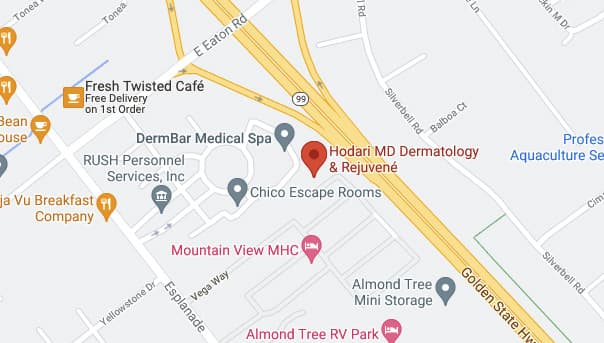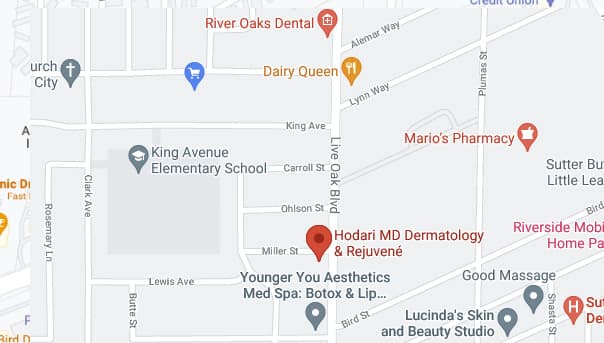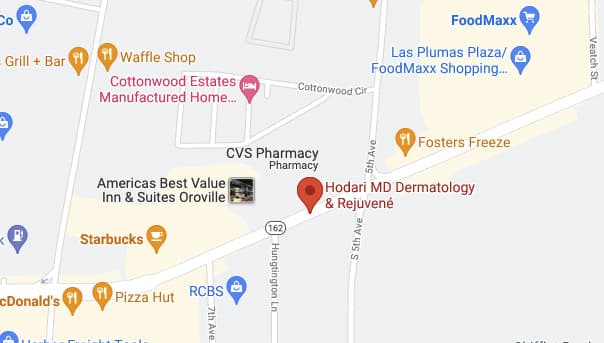Acne
A common skin condition typically associated with teenagers, acne isn’t limited to a specific age group. It usually occurs on the face, shoulders, chest, and neck and can occur in adolescence or adulthood. Acne is often an inherited condition, although stress, poor sleep habits, and hormonal changes stimulate the skin’s oil production and lead to breakouts.
How Is Acne Treated?
Treating the causes of acne, including excessive oil production, clogged pores, and bacteria, involves keeping the skin clean and using exfoliants to unclog pores. The acne treatment options we offer in Yuba City, Chico, and Oroville, include oral or topical antibiotics that can minimize the growth of bacteria and hormonal therapies to reduce oil production. We also focus on diet modification to stem acne outbreaks.
Eczema
Often called atopic dermatitis, eczema is characterized by itchy, red skin. Eczema is a common childhood ailment but can occur at any age.
How Is Eczema Treated?
The focus of eczema treatments is managing and preventing flare-ups. Oral or topical steroid medications help control flare-ups, and antibiotics may be prescribed to reduce excessive skin bacteria. Applying hypoallergenic moisturizers daily is the key to preventing major flares and treating chronic eczema.
Psoriasis
Psoriasis is an inflammatory skin condition characterized by scaly plaques, especially on the knees, elbows, and scalp. Psoriasis may affect the whole body at once or in just a few areas. Joint pain in the hands, feet, knees, or hips may accompany rashes in some patients. This is known as psoriatic arthritis. Psoriasis is linked to an increased risk of patients developing more worrisome medical conditions, such as metabolic syndrome. They should follow up with their primary care physician for their normal preventive screening measures.
How Is Psoriasis Treated?
Controlling the underlying inflammation with intermittent use of topical steroid creams can treat mild or localized psoriasis. Dr. Hodari also prescribes special medicated shampoos to treat psoriasis of the scalp. Ultraviolet light or oral medications can be used to treat moderate psoriasis, while injectable medications (biologics) that modulate the immune system are used to address severe psoriasis.
Rosacea
Redness, especially on the face, is the primary feature of rosacea. It may occasionally be accompanied by acne-like pimples or irritated eyes. Rosacea is fairly common, especially among Americans with northern European ancestry. Lifestyle and environmental factors, in addition to genetics, can also cause rosacea flare-ups. These include sun exposure, spicy foods, and drinking alcohol.
How Is Rosacea Treated?
The goal of rosacea treatment is to reduce the underlying causes of redness and inflammation. That may include sulfa-based washes, medicated creams, and, sometimes, oral antibiotics. We may also recommend BBL® PhotoFacial treatments. Identifying and reducing lifestyle and food triggers is also important to control major flare-ups.
Rashes
A rash describes any visible change to the skin’s appearance, such as what might occur after a bug bite, contacting poison oak, or hives. Acute rashes persist for a certain amount of time, such as weeks or even months, unless treated. Chronic rashes appear, fade, and reemerge intermittently and are usually caused by specific triggers. Rashes may be annoying, uncomfortable occurrences or may signal a more serious underlying medical condition.
How Is a Rash Treated?
Even though most rashes don’t pose serious health risks, it’s important to have Dr. Hodari evaluate those that do not improve or that are associated with other symptoms, such as severe itching, fever, or joint pain. Treatments might include creams or oral medications to relieve your symptoms. Dr. Hodari may also recommend tests to determine the cause of a rash.
Moles
Moles are pigmented lesions on your skin. Some people are born with moles. In other cases, moles can develop in childhood or early adulthood. Less common are moles that appear later in life. A key when evaluating moles is to notice their size, shape, and color. Small, round, brown moles typically are benign and don’t require treatment except for cosmetic reasons. Moles with irregular shapes should be monitored to see if they change size or color.
When Should You Get a Mole Evaluated?
Individuals at greater risk of developing skin cancer (people with fairer skin, for example) should schedule regular appointments with Dr. Hodari. If you’re concerned about any mole, you should schedule an appointment. Dr. Hodari may note other moles that require additional observation. A mole that changes shape or color could indicate a rare type of skin cancer called melanoma. Early detection and treatment are key.
How Are Moles Removed?
Dr. Hodari uses different techniques for mole removal in Chico, depending on the type of mole and what’s indicated in biopsy results. He may simply shave the moles off, a procedure that doesn’t require stitches, or make small incisions to remove deeper skin lesions. These procedures are performed at our office. More serious moles may need to be excised (surgically removed) during a procedure that requires a local anesthetic.
Dermatology FAQs
What is a biopsy?
Removing tissue to be evaluated under a microscope is called a biopsy. The procedure is performed in the office and involves minimal discomfort and little downtime. A topical antibiotic and bandage are applied to the treatment area afterward. Dr. Hodari may recommend biopsies to evaluate the specific nature of a rash or worrisome lesion or mole. Treatment is dictated by the biopsy results, which usually come back in less than a week.
What are the most common rosacea triggers?
While triggers vary between rosacea patients, common offenders are spicy food, alcohol, stress, exercise, and environmental factors like heat and cumulative sun exposure. Genetics is a factor as well. It’s important to understand that rosacea often intensifies if left untreated.
What should I avoid if I have psoriasis?
If you have psoriasis, avoid your known triggers. For you, triggers may be certain medications or food that contains sugar or gluten. Dr. Hodari can help you figure out what triggers your psoriasis if you are uncertain.
Does psoriasis ever go away on its own?
Psoriasis is an unpredictable condition that can go into remission, where the symptoms subside for weeks, months, or longer. If left untreated, psoriasis can worsen and lead to other health conditions.
Can rosacea be removed permanently?
Unfortunately, there is currently no known cure for rosacea; fortunately, we have effective rosacea treatments that control the redness and pimple-like bumps and prevent its progression. Med spa procedures like BBL can alleviate the redness.
Can someone just develop eczema all of a sudden?
Yes, eczema can develop later in life. It is also possible to have eczema as a child, have it go away, and then return years later.
What happens if you scratch eczema?
Scratching or rubbing eczema can make it more itchy, dry, and scaly. Excessive scratching can sometimes lead to bacterial infections.
Does mole removal hurt?
A local anesthetic is typically used before mole removal so there is no pain.
Do removed moles come back?
While unlikely when removed by a dermatologist, a mole may grow back if some of its cells are missed, which is more likely with a shave excision or cryotherapy.
At what point is a rash serious enough to see a dermatologist?
If a rash causes discomfort that can’t be managed with over-the-counter medication, lingers for weeks, or goes away and returns, it’s time to have it checked out by a dermatologist.
Schedule Your Appointment
Whether you want to maintain your skin’s general health, treat a specific skin condition, or any other medical dermatology need in Chico, Yuba City, and Oroville, CA, you can book online or call
(530) 342-8295.





